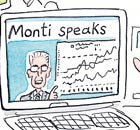.
Everyone is on holiday. The world will restart tomorrow or the day after.
At the moment there is money and it has value.
The secret police have not been ordered out to cleanup.
Iran and Turkey are not at war.
The theocrats of Israel have not bombed all of Islam.
The Messiah has not appeared on earth that we know of.
Happy New Year
http://www.nakedcapitalism.com/
http://www.telegraph.co.uk/finance/financialcrisis/
2011 was crammed with a decade’s worth of news, says
Matthew Norman.
30 Dec 2011
|
3 Comments Germany's finance minister has been accused of groundless optimism after he claimed that Europe's leaders will have "banished the dangers" of the euro crisis within 12 months.
30 Dec 2011
|
220 Comments The FTSE 100 has ended 2011 down after a turbulent year that has seen around £90bn wiped off the value of the index, but despite the fall shares in London have fared much better than those in Frankfurt and Paris.
30 Dec 2011
|
43 Comments New government to cut public spending by €8.9bn in 2012 but warned the country's deficit would be higher than expected.
30 Dec 2011
|
7 Comments Mario Monti has pleaded for the eurozone to expand its "big bazooka" bail-out fund as an expensive Italian bond auction suggested that even last week's flood of cheap loans from the ECB has failed to stem the crisis.
30 Dec 2011
|
193 Comments Spain's centre-right government will announce billions of euros in savings measures on Friday, using its first decrees since sweeping to power at November elections to give the nation a foretaste of tougher austerity to come.
30 Dec 2011
|
90 Comments Germany's finance minister Wolfgang Schaeuble says he's confident that Europe's politicians will manage to stabilize the eurozone in 2012 and keep the continent's common currency together.
30 Dec 2011
|
82 Comments Next year, 2012, must be the year the UK finally stops agonising about rebalancing its economy and actually does so, said the head of the CBI in his new year message.
30 Dec 2011
|
8 Comments The Bank of Spain has warned that the economy has worsened, rattling investor confidence in Europe's fourth biggest economy just as recently installed prime minister Mariano Rajoy prepares to unveil his immediate budget plans.
29 Dec 2011
|
83 Comments Europe is at mounting risk of a fresh credit crunch after the eurozone money supply contracted for a second month in November and the volume of private loans began to shrink.
29 Dec 2011
|
294 Comments
http://hat4uk.wordpress.com/
 Wolfman Schauble has the future in his grasp
Wolfman Schauble has the future in his graspSpain’s centre-right government has fessed up (belatedly) to this year’s budget deficit being likely to reach 8% of gdp. The overshoot is €20bn above the target agreed with Brussels, but Deputy PM Soraya Sáenz de Santamaría declared that the government would “face the problem head-on” by raising 9bn euros in taxes, and a further 6bn euros in savings. She didn’t explain how Madrid would fund the 5bn euros gap that would still be left.
Meanwhile, as the year ends and financial sites try to put 2011 into perspective, the euro’s architects remain steadfast in their desire to blame everyone and everything but the fundamental idea itself.
Former French President Valery Giscard d’Estaing said in an interview this week that a key factor in the EU debt crisis was the enlargement in 2004, when 10 countries – mostly former East Bloc nations – joined the European Union. “By the time the euro was introduced, the group was no longer homogeneous,” he opined. Hmm. Never knew that Spain, Italy, Portugal, Ireland and Greece used to be in the USSR, but then it’s all a long time ago and Val D’Oonican is getting on a bit.
“One thing was evident to me from the beginning,” says Guy Verhofstadt, Belgian prime minister from 1999 to 2008, and one of Europe’s most federalist politicians. “A state can exist without a currency, but a currency cannot exist without a state.” Nice sound-bite, but Guy maintains that the national politicians undermined the unelected Commission. Ah, so
that’s where it all went wrong. Er, but if you thought that ‘from the beginning’ Guy, then why did you go ahead old fruit?
Still, these old woodentops need not fear, for the new crop of eurozealots are continuing in the same vein. Berlin clearly means to go into 2012 force-feeding the EU with more of the Brussels bollocks that landed everyone with the euro.
Wolfie Schauble yesterday predicted confidently that that crisis will be over by the end of the year, which served only to attract a storm of ridicule during the day. If the markets were going to believe Schaublespeak, they’d have started to do so by now. But at least the old fox is being notably silent these days on the inevitability of Britain joining the euro; perhaps even he recognise a soundbite too far. On the whole, however, the German finance minister seems to me to be a student of sub-atomic physics, and thus beleefs he can change ze kvantum future by ze triumph of ze vill.
Brunhilde Merkel will tell the German people (in a New Year’s address tomorrow) that more cooperation will one day make the whole of Europe just like Germany, at which point all will be well.
“A common currency can only really be successful if we in Europe cooperate more than we have done,” Geli will say, “Europe is growing together in the crisis. The path to overcoming this remains long and won’t be free from setbacks, but at the end of it, Europe will emerge stronger from the crisis than it went into it.”
Yes, well – jolly good show. Keep right on to the end of the road….and over the cliff. I loff to go a wanderung, alonk ze mountain track, und ass I go I loff to sink mit Italians on my back….val der ree, val der raaaaaarg."
http://www.guardian.co.uk/business/debt-crisis
-
-
30 Dec 2011: Acknowledging the existence of long-term problems, Wolfgang Schäuble gives upbeat interview, ruling out the break-up of the 17-nation eurozone
-
 Cartoon, 29 Dec 2011:
Cartoon, 29 Dec 2011: Single currency stumbles after Italian bond auction
-
29 Dec 2011: Agnès Poirier: The year could not have worked out better for the president – yet he is still trailing in the polls. Will he never accept defeat?
-
29 Dec 2011: Currency reaches 15-month low against dollar amid calls from Italian PM for greater resources for eurozone bailout fund
-
 29 Dec 2011: Gavan Titley and John O'Brennan:
29 Dec 2011: Gavan Titley and John O'Brennan: Despite 'exceptional' efforts to meet IMF targets, Ireland has a rising deficit, sustained emigration and 15% unemployment
-
29 Dec 2011: Hans Lucht: As Greece struggles to avoid economic meltdown, immigrants have become scapegoats in racially motivated attacks
-
28 Dec 2011: Editorial: The UK's fortunes are tied to euroland, so when disaster arrives, Britain's economy and its banks will not escape lightly
-
 28 Dec 2011:
28 Dec 2011: Italian treasury faces bigger test as it tries to sell longer-term debt
-
28 Dec 2011: Martin Feldstein: The UK is outside the eurozone, and has its own currency, so there is no risk Britain will default on its debt
-
27 Dec 2011: Editorial: Let us fantasise that this festive quiet conceals dervish-like activity by euroland policy-makers
-
 27 Dec 2011:
27 Dec 2011: Banks are using the low risk – but low return – ECB facility in preference to lending to other banks
No matter how black things are painted it has not fallen down yet.
http://www.zerohedge.com/
Submitted by Tyler Durden on 12/30/2011 - 16:24 Copper CRB France Gilts High Yield Implied Correlation Investment Grade United Kingdom Volatility YTD Performance 
With the S&P 500 cash index closing 2011 down for the year (admittedly down 0.003181% is just 0.003181%, but it is also down),having traveled a remarkable
3240 total points from close-to-close over the course of the year, we look across asset classes and notable markets as we reflect on an increasingly intervention-driven and gap-heavy uber-correlated global investing framework.
UK Gilts, 10Y Treasuries, Gold, and Oil outperformed (rebased to USD terms) while
Greek bonds, Copper, Emerging Market stocks, and Asia Ex-Japan stocks underperformed. The Dollar closed almost 1% higher on the year, the EUR down 2.6% versus the USD as the CRB Commodity Index closed -6.67% for the year. Japanese stocks and bonds had a tough year. US investment grade bonds outperformed high yield bonds. There is much to discuss and we open the thread for any and all discussions...
Submitted by Tyler Durden on 12/30/2011 - 18:55 Alt-A Bear Stearns Ben Bernanke Ben Bernanke BLS Budget Deficit Bureau of Labor Statistics China Cohen Corruption CPI CRAP Crude Debt Ceiling European Central Bank European Union Fail Federal Reserve Financial Accounting Standards Board Foreclosures Free Money Goldman Sachs goldman sachs Government Stimulus Greece Gross Domestic Product Guest Post Housing Market Illinois Iraq Ireland Italy Jamie Dimon Jeremy Grantham John Hussman John Williams Lehman Lehman Brothers Mortgage Backed Securities Mortgage Loans NASDAQ National Debt Portugal Quantitative Easing Reality Recession recovery Robert Shiller Ron Paul Russell 2000 Savings Rate Tax Revenue Unemployment Unemployment Benefits Wall Street Journal 
The Wall Street mantra of stocks for the long run is beginning to get a little stale. If Abbey Joseph Cohen had been right for the last twelve years, the S&P 500 would be 4,000. For this level of accuracy, she is paid millions. Her 2011 prediction of 1,500 only missed by16%. The S&P 500 began the year at 1,258 and hasn’t budged. The lowest prediction from the Wall Street shysters at the outset of the year was 1,333, with the majority between 1,400 and 1,500. The same Wall Street clowns are now being quoted in the mainstream media predicting a 10% to 15% increase in stock prices in 2012, despite the fact we are headed back into recession, China’s property bubble has burst, and Europe teeters on the brink of dissolution. They lie on behalf of their Too Big To Tell the Truth employers by declaring stocks undervalued, when honest analysts such as Jeremy Grantham, John Hussman and Robert Shiller truthfully report that stocks are overvalued and will provide pitiful returns over the next year and the next decade.
Submitted by Tyler Durden on 12/30/2011 - 15:07 Mean Reversion As we pop the corks of our proverbial champagne this weekend with an eye to a better year ahead, perhaps it is worth thinking about these 11 incredible trends that have evolved in a rather disturbing manner over the last 11 years. As
John Lohman points out,
the 21st century has not been pretty for ongoing centrally planned attempts to defer the 30 year overdue mean reversion.
Submitted by Tyler Durden on 12/30/2011 - 14:44 Fractional Reserve Banking By now everyone has heard the parable explaining how the entire European bailout, courtesy of near-infinite fractional reserve banking, can be taken care of using one €100 bill. Or so the yet again flawed economist thinking went. Unfortunately, this was just a parable, and a massively flawed one at that. As the below interaction between a ZH reader and his broker elucidates, here is what this idealized story would look like in the
real world, that as we explained before, is drowning in about
$21.2 trillion in excess debt.
Submitted by Tyler Durden on 12/30/2011 - 13:42 Bond China Federal Reserve Global Economy Guest Post India Japan Meltdown Quantitative Easing Reality Reserve Currency Reuters Totalitarianism Trade Deficit Trade War Yen Yuan  The genius of globalization is not in how it “works”, but in how it DOESN’T work.
The genius of globalization is not in how it “works”, but in how it DOESN’T work. Globalization chains mismatched cultures together through circumstance and throws us into the deep end of the pool.
If one sinks, we all sink, enslaving us with interdependency. The question one must ask, then, is if all sovereign economies are currently tied together in the same way? The answer is no, not anymore. Certain countries have moved to insulate themselves from the domino effect of debt implosion, one of the primary examples being China. Since at least 2005, China has been taking the exact steps required to counter the brunt of a global debt collapse; not enough to make it untouchable, but enough that its infrastructure will survive. One could even surmise that China’s actions indicate a foreknowledge of the events that would eventually escalate in 2008. How they knew is hard to say, but if the available evidence causes you to lean towards collapse as a Hegelian creation (and it should if you are paying any attention), then China’s activity begins to make perfect sense. If a globalist insider told you that in a few short years the two most powerful financial empires in the world were going to topple like bowling pins under the weight of their own liabilities, what would you do? Probably separate yourself as much as possible from the diseased dynamic and construct your own replacement system. This is what China has done…
Submitted by Tyler Durden on 12/30/2011 - 13:27 Bond France Italy Morgan Stanley Sovereigns 
Earlier in the week, we
discussed at length the funding gaps that various European sovereign nations face as the gap between supply and coupon/redemptions can't be assumed to be rolled away (and Europe faces EUR43.5bn of net cash-flow surplus from sovereigns into the 'market'). In order to better comprehend the timeline, Morgan Stanley has published both the complete issuance calendar for European bonds and bills over the next five weeks as well as a breakdown of the flows that are dominated by next week and the first week of February.
It seems the market this week is starting to reprice for this risk in Italy and France not being able to roll so easily (and perhaps front-run that 'cash-flow' into US Treasuries as a haven) as the latter faces a considerable supply and flow on Thursday January 5th.
Submitted by Tyler Durden on 12/30/2011 - 12:15 Eurozone Mises Institute Sovereign Debt 
The realization that the European debacle is much more an issue of political harmonization and Empire-building than one of pure economic band-aid provision should be clear to any- and every-one who has followed the words and deeds of the various European factions for the past year or two. Yesterday,
we discussed the dithering and competing camps but what is really
critical is to understand how we got here and what the underlying social and political wills are among all of the players. There is no better summation of the formation, driving forces, and tensions among European leaders and central bankers than
Phillip Bagus'
'Tragedy Of The Euro'. From the simple divergence of the dual visions of Europe with northern libertarians and southern socialists to the Bundesbank's fearsome reputation for showing up weak governments, Bagus offers a clear perspective on why the
EMU is a 'self-destroying' and 'conflict-aggregating' system but counters that with some views on what the outcome will be and how French governmental pressure remains the cornerstone of the establishment of a European Empire for better or more likely for worse. As we enter a new year with the first quarter dominated by action-forcing events, perhaps there has never been a more important time to understand the political and economic vices and virtues of the European nations.
http://www.bbc.co.uk/news/business/
30 December 2011 Last updated at 19:41 ET
Spain's new conservative government announces 8.9bn euros in austerity measures in order to lower the country's borrowing.
World stock markets finish one of the most dramatic years for the global economy, with most well down for the year.
The euro is near its low for the year following a tumultuous 12 months in which its existence has been questioned.
- Most economists polled by the BBC say recession will return to Europe next year, while UK interest rates will stay at 0.5%.
- Hungary passes a controversial new law that critics say could undermine the independence of its central bank.
- A key panel of Japan's ruling party agrees to postpone a planned sales tax increase amid rising opposition to the move.
-
-
-
-
-
-
-
-
-
-
http://www.spiegel.de/international/topic/euro_crisis/

DPA
Endangered Currency
First Greece -- then Ireland, Italy, Spain and Portugal: The European common currency has come under pressure from large national debts and the effects of the global financial crisis, ultimately requiring a rescue package close to a trillion euros.
Delusions of the Euro Zone
SPIEGEL ONLINE - December 30, 2011 Since its inception, the euro zone has been built on lies, the most grievous of which is the idea that the common currency could work without political union. But Europe's politicians are currently suffering under a different but equally fatal delusion -- that they have all the time in the world to fix the crisis.
A Commentary by Armin Mahler more... [ Forum ]
Former Deutsche Bank CEO Hilmar Kopper
SPIEGEL ONLINE - December 29, 2011 As the former head of Deutsche Bank, Hilmar Kopper was once the most powerful banker in Germany. In an interview with SPIEGEL, the 76-year-old takes stock of his career and the current crisis shaking Europe. The three main constants he has seen in the world, he says, are "money, avarice and greed."
more... [ Forum ]
SPIEGEL Interview with Ex-German High Court Justice
SPIEGEL ONLINE - December 28, 2011 In an interview conducted as he heads into retirement, German Constitutional Court Judge Udo Di Fabio explains why he believes the high court's recent decisions on the European Union will not necessarily hinder further European integration and how he believes debates over possible changes to Germany's constitution to strip power from Karlsruhe are "phoney."
more... [ Forum ]
Deeply Divided
SPIEGEL ONLINE - December 28, 2011 Six weeks after forming a transitional government to overcome its crisis, Greece is still failing to deliver its promised reforms. The cabinet of Prime Minister Lucas Papademos is deeply divided and has lost the public's confidence. Even the most urgent measures have ground to a halt.
By Ferry Batzoglou in Athens more...
Measure of Fear
SPIEGEL ONLINE - December 27, 2011 Just before Christmas, the European Central Bank flooded the financial markets with 500 billion euros -- a move that may not ultimately have the desired effect of stabilizing banks. Instead of passing that money on in loans to businesses to spur the economy, European banks have redeposited the money with the ECB at low interest rates.
more...
Defying the Euro Crisis
SPIEGEL ONLINE - December 27, 2011 The global economy is at risk from all sides, with the European debt crisis, a weak US economy and a slowdown in China. But most German companies are still doing well, and executives are optimistic about 2012. Experts wonder, however, how long the export-driven German economy will be able to elude the gathering storm.
By SPIEGEL Staff more... [ Forum ]
The 'German Premier'
SPIEGEL ONLINE - December 21, 2011 Armed with 45 experts and 30 years of experience, Horst Reichenbach is in Athens to help the Greeks economize and institute reforms. His conclusions about their situation are sobering, but he also reports a new sense of determination for tackling the debt crisis there.
By Julia Amalia Heyer more...
Massive Lending Operation
SPIEGEL ONLINE - December 21, 2011 The European Central Bank has launched the biggest lending operation in its history, and banks pounced on the offer on Wednesday, borrowing almost a half-billion euros for three years at a low interest rate. Governments hope the banks will use the cash to buy sovereign bonds, but critics warn the ECB's strategy is risky and could stoke inflation.
By Stefan Kaiser more...
What Crisis?
SPIEGEL ONLINE - December 20, 2011 German companies and consumers are upbeat about the future, according to economic surveys released on Tuesday. They show that Europe's largest economy has remained resilient in the face of the euro crisis despite expectations that the common currency zone is headed for recession.
more...
Resistance in London
SPIEGEL ONLINE - December 20, 2011 EU finance ministers wanted to raise 200 billion euros to boost the International Monetary Fund's firepower in the euro crisis, but they only raised 150 billion on Monday, largely due to resistance from Britain. Germany, meanwhile, will have to rework its 2012 budget to help finance the new permanent euro rescue fund.
more...
A Currency Crisis Debate
SPIEGEL ONLINE - December 20, 2011 How to save the euro? Some believe that the European Central Bank is the key to any solution. Others think that the euro zone should be contracted and the weak members squeezed out. SPIEGEL spoke with two leading German economists about the currency's future. Their one area of agreement? Something must be done quickly.
more... [ Forum ]
http://krugman.blogs.nytimes.com/2011/12/31/a-thought-on-debt-history/
By PAUL KRUGMAN
Once again, when politicians and policy makers decided to focus on deficits, not jobs, they proved Keynes right about a slump being the wrong time for austerity.
























 Earlier in the week, we
Earlier in the week, we  The realization that the European debacle is much more an issue of political harmonization and Empire-building than one of pure economic band-aid provision should be clear to any- and every-one who has followed the words and deeds of the various European factions for the past year or two. Yesterday,
The realization that the European debacle is much more an issue of political harmonization and Empire-building than one of pure economic band-aid provision should be clear to any- and every-one who has followed the words and deeds of the various European factions for the past year or two. Yesterday, 
 Global markets finish a wild 2011
Global markets finish a wild 2011










